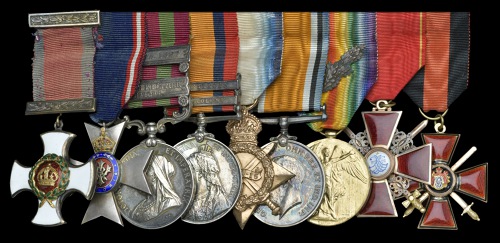Lot Archive

The Great War D.S.O., ‘Presentation of the Colours’ M.V.O. group of nine awarded to Captain T. C. FitzHugh, Royal Irish Regiment
Distinguished Service Order, G.V.R., silver-gilt and enamel, with integral top riband bar; The Royal Victorian Order, M.V.O., Member’s 5th Class breast badge, silver and enamel, reverse officially numbered ‘44’; India General Service 1895-1902, 2 clasps, Punjab Frontier 1897-98, Samana 1897 (2d. Lieut. T. C. Fitzhugh 2d. Bn. Ryl. Ir: Regt.); Queen’s South Africa 1899-1902, 2 clasps, Cape Colony, Wittebergen (Lieut: T. C. Fitz-Hugh. Rl: Irish Regt.); 1914-15 Star (Capt. T. C. Fitz Hugh. M.V.O. R. Ir. Regt.); British War and Victory Medals, with M.I.D. oak leaves (Capt. T. C. Fitz Hugh.); Russia, Empire, Order of St. Anne, Third Class breast badge, with Swords, 44mm, gold (56 zolotniki) and enamel, gold mark and 1865-96 assay office mark to suspension loop; swords possibly added at a later date, the obverse central medallion re-painted; Russia, Empire, Order of St. Vladimir, Fourth Class breast badge, with Swords, 40mm, gold (56 zolotniki) and enamel, gold mark and 1896-1908 kokoshnik mark to suspension loop, with additional gold marks and 1918-17 kokoshnik marks to hilts of swords, reverse central medallion missing and replaced with a painted plate, mounted as worn, generally good very fine (9) £4000-5000
D.S.O. London Gazette 1 January 1918.
M.V.O. 5th Class London Gazette 11 August 1903
Russia, Order of St. Anne, Third Class with Swords, London Gazette 16 July 1921.
Russia, Order of St. Vladimir, Fourth Class with Swords, London Gazette 16 July 1921.
Terrick Charles FitzHugh was born in London on 16 November 1876, the son of William FitzHugh Esq., and was educated at Wellington College and the Royal Military College, Sandhurst. He was commissioned Second Lieutenant in the Royal Irish Regiment on 5 September 1896, and proceeded overseas with the 2nd Battalion to India on 26 January 1897. He saw action with them during the operations on the Samana Ridge and in the Kurram Valley, August to September 1897, and then at the Relief of Gulistan, 12-13 September 1897. Promoted Lieutenant on 15 March 1899, he transferred to the 1st Battalion, and served with them in South Africa during the Boer War, where he was present during operations in the Cape Colony, south of the Orange River, including the actions at Colesberg, 24 January to 12 February 1900; operations in the Orange Free State, March to May 1900; and operations in the Orange River Colony, May to July 1900, including the action at Bethlehem, 6-7 July 1900.
Proceeding to India on 28 June 1902, FitzHugh returned home on 18 March 1903, and was stationed in Ireland with the 2nd Battalion at the time of H.M. King Edward VII’s visit to Ireland, 1 July to 1 August 1903. During the visit the Battalion received new Colours from the King, with FitzHugh being one of the Officers in the Colour Party, and as a consequence he was appointed to the Fifth Class of the Royal Victorian Order. He was promoted Captain on 14 October 1903, and, having qualified as an Interpreter in both German and Russian, proceeded to the Staff College in 1905, passing its final examinations in 1907, by which time he had also qualified as an Interpreter in French.
FitzHugh transferred to the Reserve of Officers on 28 May 1907, and subsequently obtained employment with the British Engineers’ Association as its Commissioner in China, where he added Mandarin to his repertoire of languages. On the outbreak of the Great War he returned to England and re-joined his old Regiment, proceeding to France with the Second Battalion in December 1914. He remained with the Regiment until 5 May 1915, taking part in the early stages of the First Battle of Ypres, before transferring to the Quartermaster-General’s Department as a Staff Officer, first at Calais until October 1915, and subsequently at Dunkirk. His final appointment during the War was at the Headquarters of the Chinese Labour Corps, where his knowledge of Mandarin was put to good use. For his services during the Great War, he was twice mentioned in Despatches (London Gazettes 4 January 1917 and 11 December 1917), and was created a Companion of the Distinguished Service Order.
FitzHugh returned to England in December 1918, and subsequently served in the Russian Intervention, as part of he British force operating out of Murmansk. He also served with a British Mission in Estonia, and assisted in the repatriation of British Prisoners of War from Finland. For his services he was again Mentioned in Despatches ‘for valuable services in connection with military operations in Finland and the Baltic States’ (London Gazette 3 February 1920), and was awarded the Russian Orders of St. Vladimir, Fourth Class with Swords, and St. Anne, Third Class with Swords. Demobilized on 11 June 1920, he continued to act in the Baltic area on behalf of the British Committee of the Russian Red Cross in Great Britain, by going to Finland to report on the situation regarding the large number of Russian refugees in that country, before returning once more to China. He died in the German Hospital, Peking, on 12 August 1939.
Share This Page